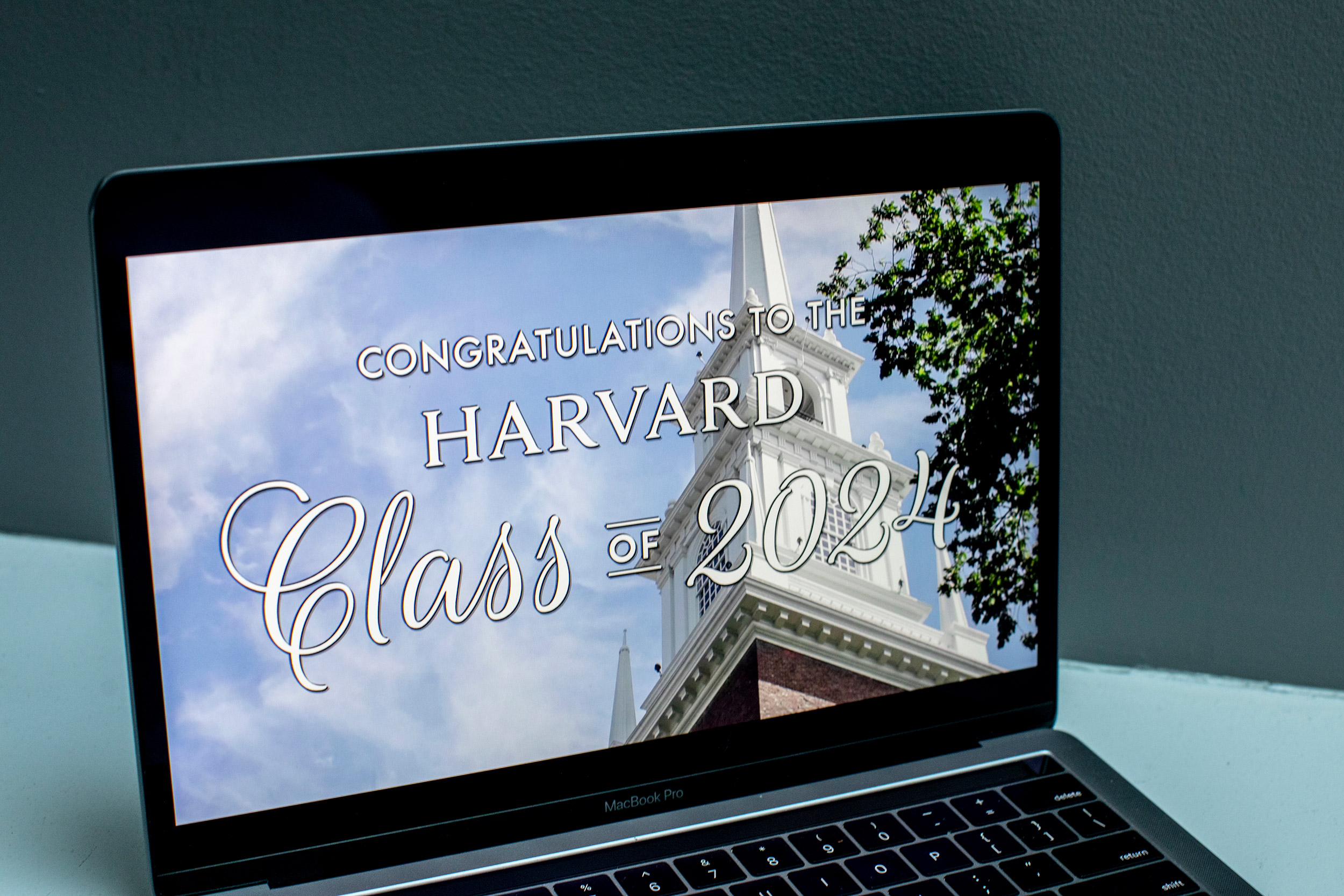
Photos by Rose Lincoln/Harvard Staff Photographer
‘Find your way to heal this world’
Class of 2024 offered a warm welcome in a first-ever remote Convocation
In the University’s first-ever virtual first-year Convocation, President Lawrence S. Bacow on Tuesday urged the Class of 2024 to “find your way to heal this world.” Bacow made his address from his home study midway through the live-streamed event, a welcome of hope but sober awareness that it comes amid a lingering pandemic and an explosively contentious period in America’s history.
With music and speeches, themes of unity and social engagement ran throughout the hour-plus ceremony, greeting the new class of 1,421 students from 55 countries, some of them in residence on campus and others in their own homes. The speakers emphasized that despite the climate of political and social unrest and the necessity of social distancing, Harvard remains one community.
Bacow noted the nature of that community, its inclusivity and also its inherent duties. In doing so, he also gave the incoming first-years, at least those eligible, their first assignment: “Register to vote. Inform yourself of the candidates and the issues, and cast a ballot,” he said. “It’s the first responsibility of citizenship in democracy, and at Harvard we take this responsibility very seriously.”
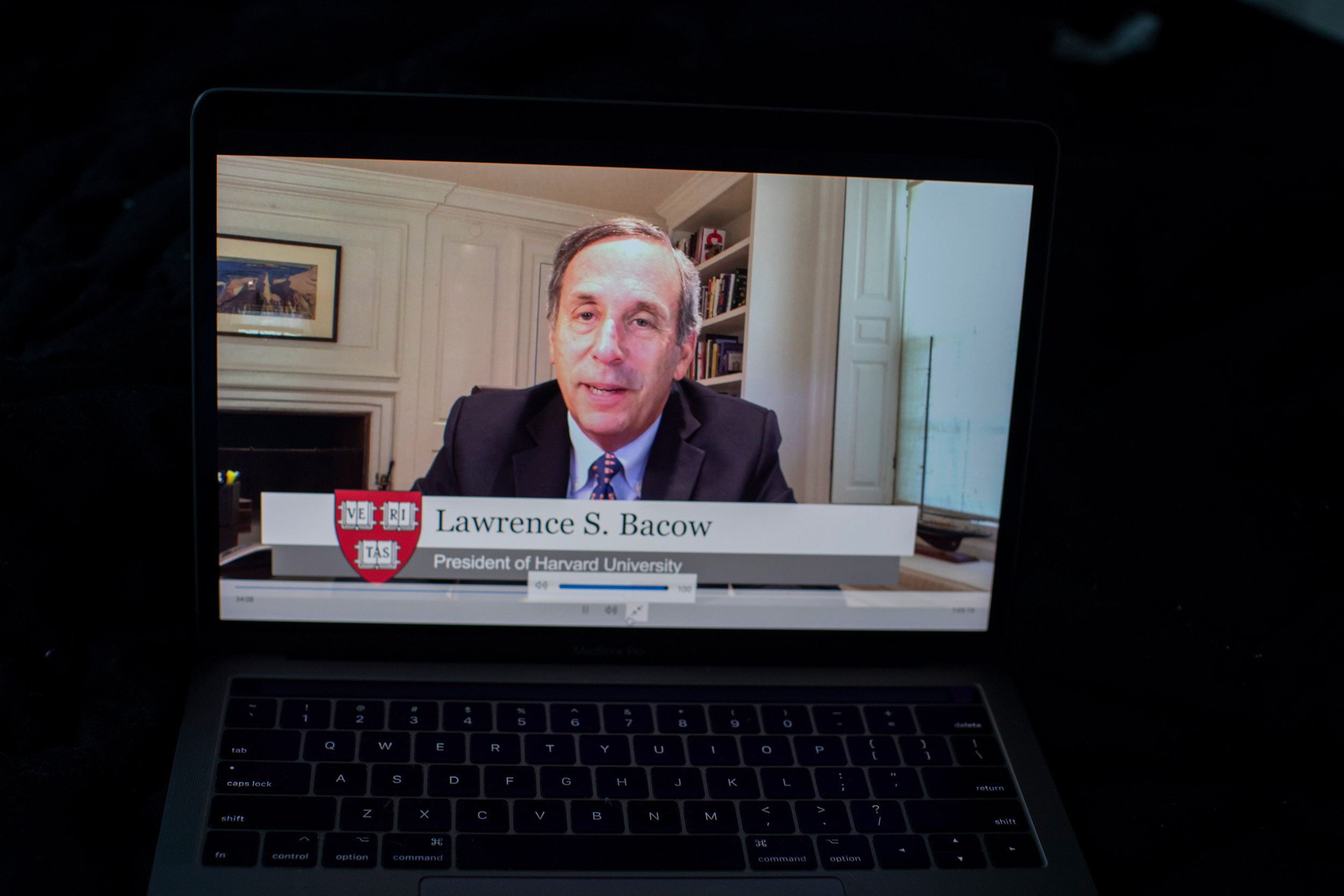
That responsibility will not end in November, he continued. “Find your cause and fight for it. When you see something wrong, try to right it,” he said. “Always remember, anything worth doing tends to generate discussion and debate.” Debate, he pointed out, is part of the Harvard experience. “Every conversation that deepens your understanding of something that’s important to you even if — especially if — it is the perspective of someone who disagrees with you, is education, too.”
Offering resources and reassurance, the day’s other speakers welcomed the new class even as they too challenged them to engage. Following the traditional tolling of the bells of Memorial Church — which, in other years, would have rung in the parade of first-years — Rakesh Khurana, Danoff Dean of Harvard College, acknowledged the unusual nature of the gathering. Invoking J.R.R. Tolkien’s “The Lord of the Rings,” he recalled the hobbit Frodo Baggins’ lament about the evil in the world, followed by the wizard Gandalf’s words of advice and consolation: “All we have to decide is what to do with the time that is given us.”
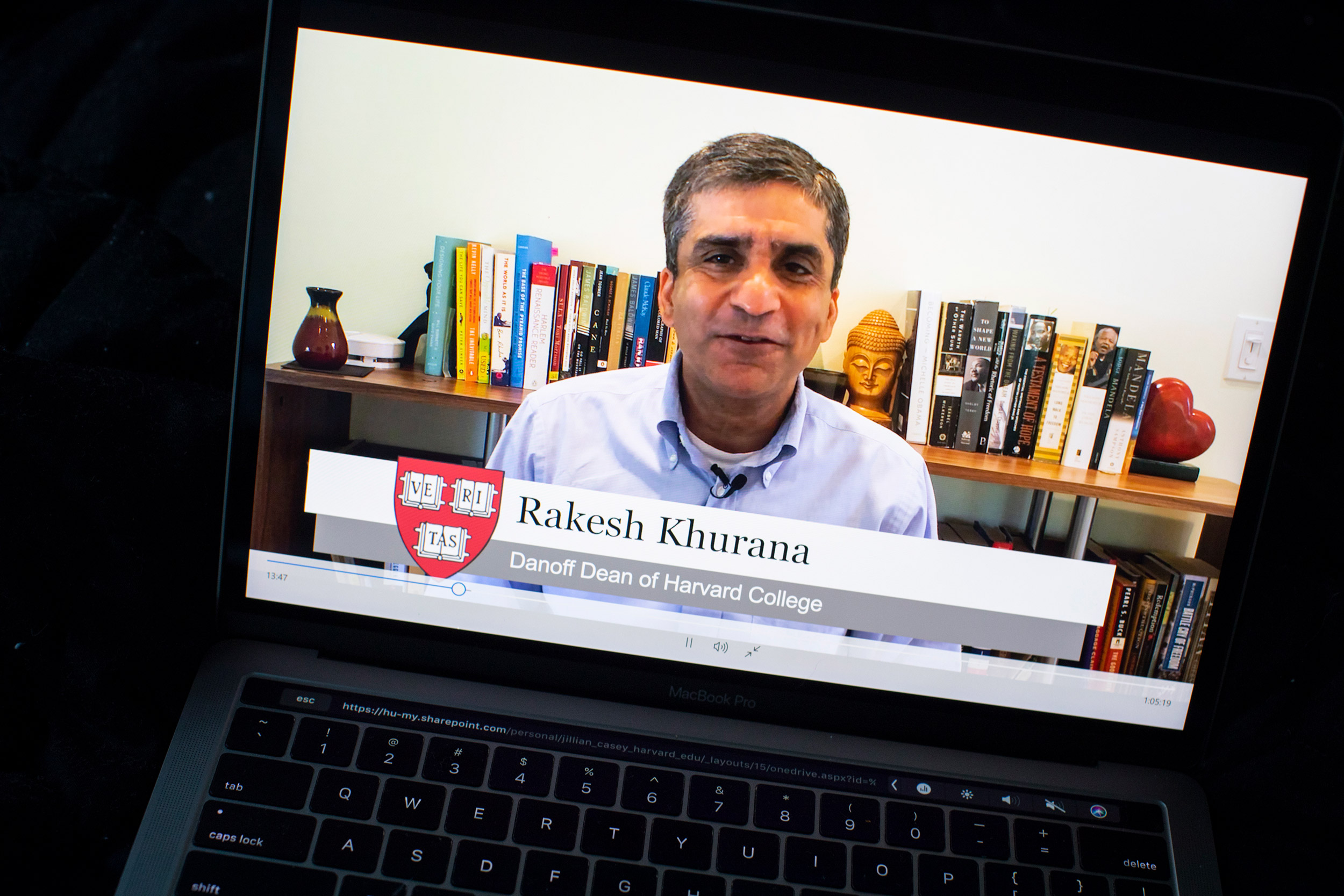
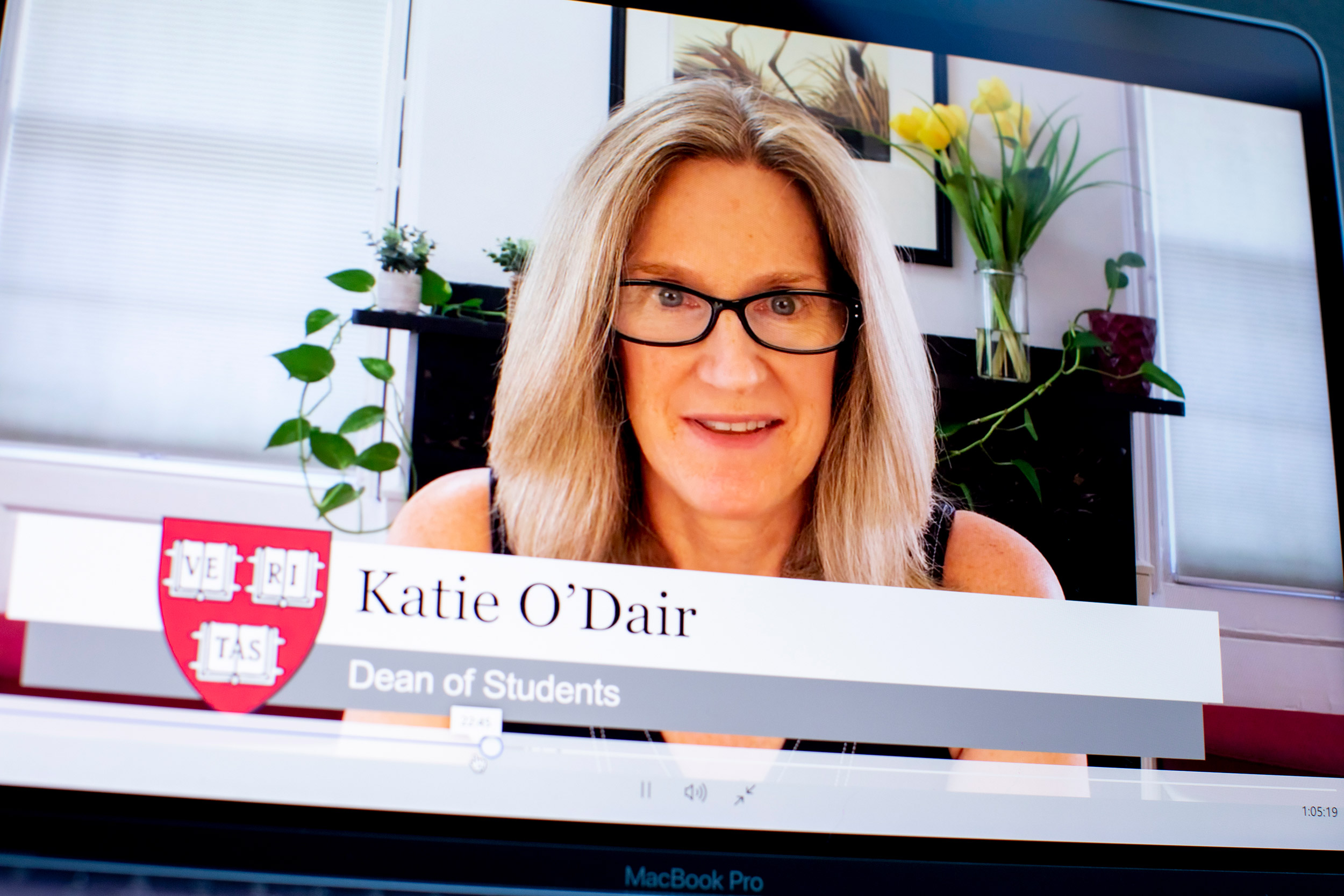
Rakesh Khurana, Danoff Dean of Harvard College, and Katie O’Dair, dean of students, shared personal insights in their welcome to first-years.
“Harvard is where you are, but not who you are,” said Khurana. “It’s time to stop looking backward and start looking ahead.” Urging first-years to seek a transformational rather than a transactional experience, he continued, “College is not a stop on the way to the rest of your life. This is your life.”
Beginning her fourth year as dean of students, Katie O’Dair spoke next, recalling how scary and lonely it can be to come to a new place. As a counter to that, she suggested first-years see their arrival at Harvard — whether real or virtual — as a chance to “press the reset button.”
“You can choose what you bring to your new home here at Harvard or remotely, all the things that make you who you are, and you can also choose what you want to leave behind,” she said. “We need people like you to offer ideas, to get involved. To push back when something isn’t right. To show up — and, yes, to vote.”
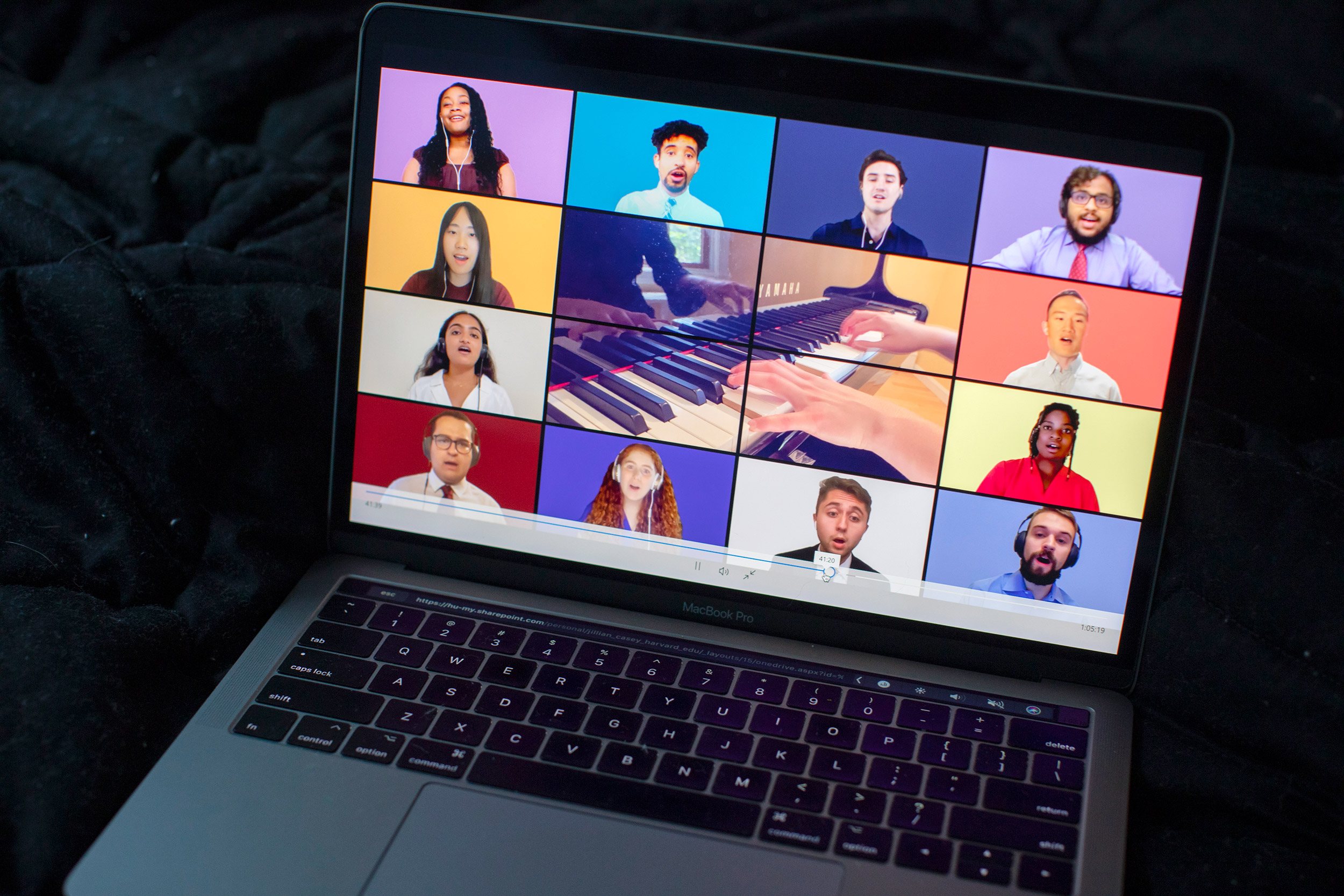
In a time when the common social concerns of first-years could be heightened by social distancing, several speakers stressed the inclusiveness of the campus. As O’Dair said, “You belong here. This is our collective home, and our collective community. You are not a guest at Harvard. You are Harvard.”
The Convocation then presented video greetings from some of the Class of 2024’s far-flung members. Trading heartfelt hellos, jokes, and a few very bad puns, students from Australia to Ukraine, Harlem to Hawaii, bonded by posing with their families and pets, demonstrating pastimes from drumming to skateboarding. The charming montage was set to music by Leonard Bernstein ’39, a note that led into Bacow’s address, as he pointed out that the Harvard community is “more than 315,000 strong, living and working in nearly every country — and making countless contributions in communities around the world.”
It was followed by a moving musical segment titled “Love Is Love.” The Zoom-style production of Pachelbel’s Canon, a traditional arrangement performed by the Harvard Choruses and Kuumba Singers, featured individual singers coming together in harmony before switching to a video collage of Harvard students doing public service in various localities.
The next speaker, Dani Peréz ’21, co-chair of FYRE (First-Year Retreat and Experience), a pre-orientation program for first-generation, low-income, and underrepresented students, shared a personal reminiscence.
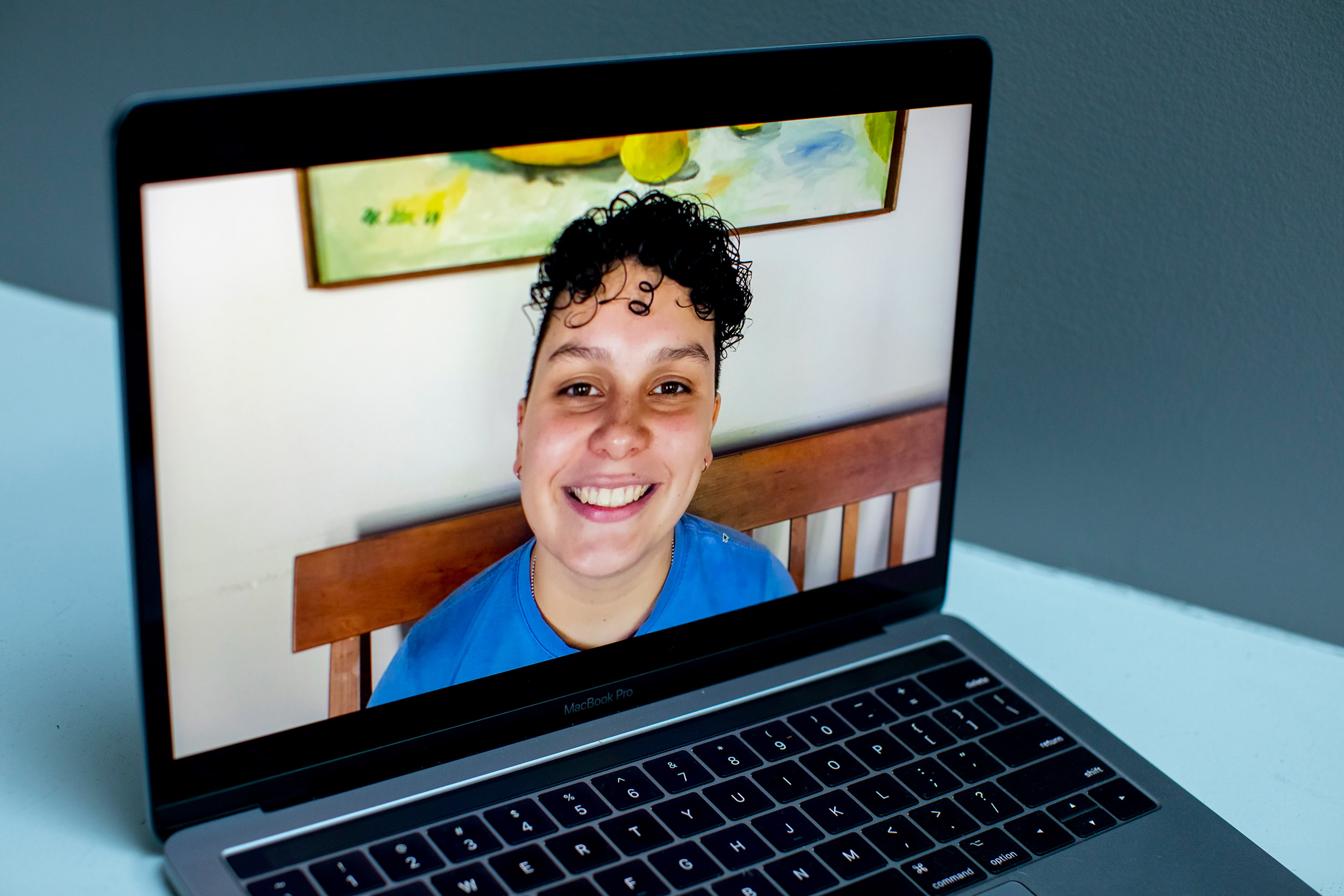
Coming from a small town in Minnesota, Peréz initially felt intimidated at Harvard. “I was the first in my high school and my family to go to a place like Harvard,” said Peréz, whose family immigrated to the U.S. from Venezuela. “I felt I was the Admissions Office’s single greatest fumble of all time.”
With a warm smile, the rising senior then assured the new students that such fears, known on campus as “imposter syndrome,” are common — and groundless. Instead, Peréz said, differences — even labels like “disadvantaged” or “underprivileged” — only mean that each first-year has more to give. While encouraging students to ask for help and take advantage of all the resources available, from faculty office hours to support groups, Peréz made one point clear: “You belong at Harvard, just as you are right now, no adjustments necessary.”
A final word of advice came from Amanda Claybaugh, dean of undergraduate education, who rounded out the ceremony by warning students about the temptation of “busy culture,” an overscheduled life that doesn’t allow for in-depth experiences.
“Transformation takes time,” she said. “Commit to fewer things so you can do those things more meaningfully.” Rather than seeing the Harvard experience as a series of items on a checklist, take opportunities to explore, she advised. She told the first-years to give themselves time.
“Time to attend a poetry reading, participate in a hackathon, time to go on a field trip, time to get lost in the archives,” she said. “Time to be transformed.”




